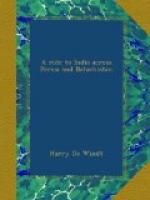(1) In the year 1851, during one of the hot months, certain officers of the Sind Horse were sleeping at night on the roof of General Jacob’s house at Jacobabad. They were awakened by a sensation of suffocation and an exceedingly hot and oppressive feeling in the air, while at the same time a very powerful smell of sulphur was noticed. On the following morning a number of trees in the garden were found to be withered in a very remarkable manner. It looked as if a current of fire, about two yards in breadth, had passed through the garden in a perfectly straight line, singeing and destroying every green thing in its course. Entering on one side, and passing out at the other, its tract was as clearly defined as the course of a river.
(2) At the close of 1856 a party of five men were crossing the desert of Shikarpur, being on their way from Kandahar to that city, when the blast crossed their path, killing three of them instantly and seriously disabling the other two.
(3) A “moonshi” with two companions was travelling about seven miles south-east of Bagh, in Kachi (not far distant from Mangachar). About two o’clock the blast struck them. They were sensible of a scorching sensation in the air, accompanied by a peculiar sulphurous smell, but remembered nothing further, as all three were immediately struck to the ground. They were afterwards found and carried to Bagh, where, every attention being afforded them, they ultimately, after many days of sickness, recovered.
As regards the strength of the juloh, Pottinger writes that, so searching is its nature, it has been known to kill camels and other hardy animals, and its effects on the human frame are said by eye-witnesses to be the most agonizing and repulsive imaginable. Shortly after contact with the wind the muscles of the sufferer become rigid and contracted, the skin shrivels, a terrible sensation as if the skin were on fire pervades the whole frame, while, in the last stage, the skin cracks into deep gashes, producing haemorrhage, quickly followed by death. It is curious to note that the juloh is peculiar to the northern districts of Sarawan and Kach-Gandava, and does not exist in the southern provinces of Baluchistan.
The road from Mangachar to Mastung is good, though slightly undulating, and intersected by deep “nullahs.” The estimated area of the Mastung district is two hundred and eighty miles. It is aptly named “The Garden of Baluchistan,” for considerably more than two-thirds of its area are under cultivation. Water at Mastung is never-failing, and the pretty town, nestling in a valley of vineyards and fruit-gardens, fig and olive trees, reminded one more of some secluded town in the Pyrenees or south of France than a Baluch settlement. The soil hereabouts is light and sandy and particularly favourable to the cultivation of grapes, of which there are no less than five kinds. Apricots, peaches, plums, and pomegranates are also grown, and supply the markets of Quetta and Kelat. Madder and tobacco are also exported in large quantities from Mastung, which possesses a neatly built and busy bazaar.




